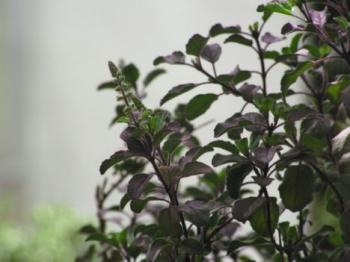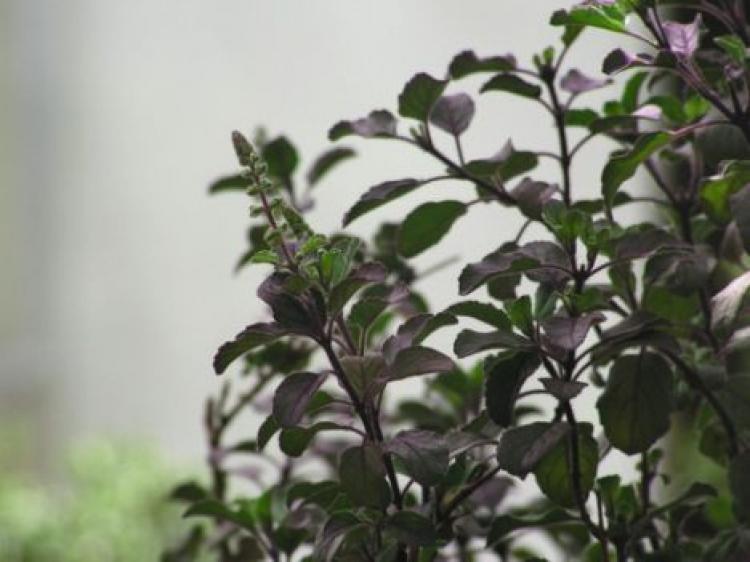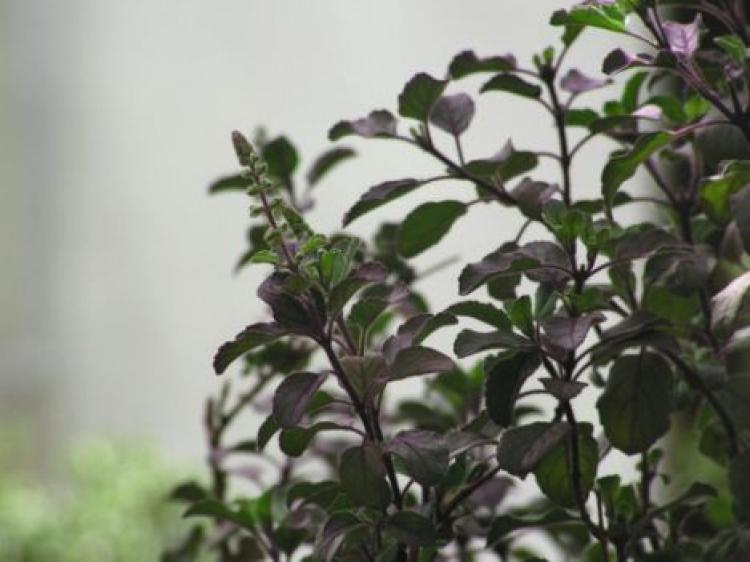Nicknamed “the Queen of Herbs,” Tulsi (or Ocimum sanctum) is highly prized among the East Indians for its calming effect and overall enhancement of wellbeing.
Tulsi, a shrub that blooms in red, white, and purple, is considered to be the most important herb in Indian Ayurvedic natural medicine. The herb diminishes inflammations and infections, lowers cholesterol levels, cleans toxins from the body, has antibacterial properties, and aids in digestion.
The herb strengthens the immune system and promotes concentration.
A Hindu home is believed incomplete without the plant growing in the garden or courtyard. Spiritually minded Indians attribute protection for home and family to the herb. Many homes feature the plant growing at the entrance. The plants are also found in Indian and Nepalese temples. The name, translated from Sanskrit, means “The Incomparable.”
The herb has now conquered German tea houses, which offer Tulsi in combination with other aromatic blends. Whether hot or cold, the tea brewed from the ingredients tastes equally good. I recently tasted an excellent tea made from Tulsi, green rooibos, chamomile, and rose blossoms.
Background
Tulsi is known by various names, including Tulassi, Manjari, Krishna Tulsi, Trittavu, Tulshi, Thulsi, The King’s Basil, and Holy Basil.
Tulsi is heavily branched and grows to a height of about 29–36 inches. The plant has oval-shaped leaves up to 2 inches long. There are two types of Tulsi: Green-leafed Tulsi is called Shri Tulsi; red–leafed Tulsi is called Krishna Tulsi. Its seeds are flat and yellow to reddish in color. The leaves of Tulsi contain essential oil.
Other relatives of the plant are Ocimum canum (Ram Tulsi or Kali Tulsi), Ocimum basilicum, Ocimum kilmand, and Ocimum scharicum.
Tulsi is widely grown in the Gir Wildlife Sanctuary and Sasan Gir National Park in India, but grows wild in the tropics and warm regions.
Tulsi seeds germinate easily and are mainly sown in the spring. They are watered from time to time and germinate within one to two weeks. Tulsi prefers rich soil and requires full sunlight.
Medicinal Uses
Tulsi is taken as an herbal tea. The oil extracted from the Karpoora Tulsi is mostly used in toiletries. However, its oil is also used for insect bites and bacterial infections of the skin. The Rama Tulsi is an effective remedy for severe, acute respiratory syndrome. The juice of its leaves gives relief for colds, fever, bronchitis, and coughs.
Tulsi oil is also used as eardrops, and even helps in curing malaria. It is very effective against indigestion, headache, hysteria, insomnia, and cholera. Millions of people take fresh leaves of Tulsi every day.
Tulsi wood is considered more powerful than any gem that helps to protect one from negative influences. Thus, many people wear Tulsi beads, which are said to have certain physical and medicinal properties. One can buy several handcrafted jewelry items made of Tulsi wood.
Cultural Importance
Tulsi is the sacred plant dear to the Lord Vishnu. Tulsi symbolizes purity. It is considered the holy plant on the Indian Subcontinent.
Tulsi got its name from Tulasi Devi, who was one of Lord Krishna’s eternal consorts. In India, people grow Tulsi for religious purposes and worship it. Its leaves are used in temples for worship and also on special occasions such as marriages.
Even today, people in India maintain potted Tulsi plants. The stems, leaves, seeds, and even soil, is considered holy. According to ancient texts, Tulsi is glorified as the one who helps in bringing people closer to the divine.
Read the original article in German: http://www.epochtimes.de/articles/2005/11/10/6313.html





